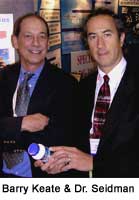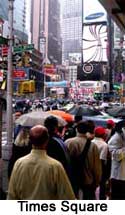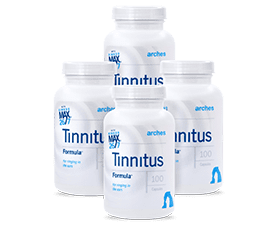Notes on the 22nd Annual Meeting of the International Tinnitus Forum
By Barry Keate
Barry Keate, has lived with tinnitus over 40 years and has published 150+ research articles on numerous aspects of tinnitus. He is an expert on the condition and a well-known advocate for those with tinnitus.
 The AAO is the official organization of all American Otolaryngologists with over 10,000 active members. This year the AAO honored Dr. Michael Seidman with their prestigious “Physician of the Year” Award. Dr. Seidman is the director of a major tinnitus center and has endorsed Arches Tinnitus Formulas for over four years. His award was based on community service, continuing scientific research and his unparalleled doctor-patient skills.
The AAO is the official organization of all American Otolaryngologists with over 10,000 active members. This year the AAO honored Dr. Michael Seidman with their prestigious “Physician of the Year” Award. Dr. Seidman is the director of a major tinnitus center and has endorsed Arches Tinnitus Formulas for over four years. His award was based on community service, continuing scientific research and his unparalleled doctor-patient skills.
 The International Tinnitus Forum is an annual meeting of eminent researchers and scientists concerned with furthering advances in the prevention and treatment of tinnitus. It is hosted by the Martha Entenmann Tinnitus Research Center at State University, New York (SUNY). The Program Chair is Abraham Shulman, MD, Professor Emeritus of Otolaryngology at SUNY and Program Coordinator is Barbara Goldstein, Ph.D., the Director of Audiological Research. Dr. Michael Seidman is the Co-Moderator of the Forum and the Senior Editor of the International Tinnitus Journal, which publishes papers presented at the Forum.
The International Tinnitus Forum is an annual meeting of eminent researchers and scientists concerned with furthering advances in the prevention and treatment of tinnitus. It is hosted by the Martha Entenmann Tinnitus Research Center at State University, New York (SUNY). The Program Chair is Abraham Shulman, MD, Professor Emeritus of Otolaryngology at SUNY and Program Coordinator is Barbara Goldstein, Ph.D., the Director of Audiological Research. Dr. Michael Seidman is the Co-Moderator of the Forum and the Senior Editor of the International Tinnitus Journal, which publishes papers presented at the Forum.
As usual the meeting this year was especially interesting for me. Many of the papers presented dealt with antioxidants helping to prevent hearing loss and tinnitus. There were discussions of niche obstruction in the round window which complicates intratympanic drug therapy for tinnitus. Some discussions were highly complex. One discussion of statistical analysis of brain scans left me pretty well glazed over. Much of the information, however, was attainable and informative.
The remainder of this article offers a brief overview of the presentations. It is heartening to see how much research is being invested in the causes and treatments of tinnitus.
1 – Alfred Stracher, Ph.D. presented a paper on Gentamycin ototoxicity and its effect on hearing and tinnitus. Gentamycin (jen-ta-MYE-sin) is a broad-spectrum antibiotic in the aminoglycoside family. Unfortunately, it also activates Calpain, a protease that can cause degenerative neurological damage such as Parkinson’s disease, ALS, Multiple Sclerosis, and hearing loss. The protease inhibitor Leupeptin stops the action of Calpain and will prevent hearing loss if used prior to Gentamycin exposure. It can also be helpful for macular degeneration and glaucoma, which are both Calpain related.
2 – I was eagerly anticipating the next presentation. Richard Kopke, MD, formerly of the Naval Medical Center in San Diego, gave his presentation on antioxidants and Noise Induced Hearing Loss. We included information from Dr. Kopke’s research in an article we published on antioxidants and tinnitus .
Dr, Kopke has found that tinnitus is present in 65% of people with Noise Induced Hearing Loss. The frequency of the tinnitus matches the transition frequency from better hearing to worse. He states that high noise damages the hair cells in the cochlea and produces increased glutamate. This in turn generates free radicals which do most of the damage to the auditory nerve. The peak of glutamate production is reached 3-10 days after the noise trauma.
Glutathione is the primary antioxidant within the inner ear. Immediately after noise trauma, glutathione levels increase to neutralize the increase in glutamate. After continuous trauma, however, glutathione levels decrease and damage occurs.
NAC (N-Acetyl-Cysteine) is a precursor to glutathione and is very effective in preventing hearing loss from noise trauma. Dr. Kopke is now conducting a clinical trial using 900 mg of NAC three times daily to reverse the effects of noise trauma. He believes the therapeutic window for preventing damage is 3-5 days after the trauma. Results of his trail will be published next year.
He went on to state something I had not heard before. Acetyl-L-Carnitine is also very helpful in preventing hearing loss. He did not give a dosage for this but did say the two together are more effective than either one by itself. Vitamin E can also help prevent damage. Dr. Seidman has since informed me that he recommends 600 mg of Acetyl-L-Carnitine daily for prevention of hearing loss.
Dr. Kopke discussed prevention of hearing loss not improvement after the fact. It is still very important to include antioxidants in the diet and as supplements. After noise exposure take extra amounts of these important nutrients to prevent further damage.
3 – Claus F. Claussen, MD is Professor Extraordinarius of Neurotology at Wurzburg University in Germany. His work for many years has centered on whiplash injury and methods to treat it. He states that 99.5% of people with whiplash injury have vertigo and 82.4% have tinnitus. He has developed models for vestibular spin lesions. He has also developed equipment that can measure the way a person steps and moves their head and shoulders relative to the direction of movement. In this way he can determine where lesions have occurred in the spine and brain stem.
4 – The Guest of Honor at this year’s meeting was Leonard Ryback, MD, Ph.D. His presentation was “Neurochemistry of the Auditory System following Ototoxic Drug Exposure.” The drug in question is Cisplatin (sis-PLA-tin) which is a drug used in chemotherapy for many types of cancers. It is highly ototoxic, meaning toxic to the ears, and causes hearing loss and tinnitus.
Tinnitus occurs in patients treated with Cisplatin who have hearing loss, but also in those who do not. It causes tinnitus in 59% of patients treated with it. Obviously, this is a major side effect of the medication that affects thousands of patients. Cisplatin reduces glutathione, thereby leaving the cochlea open to damage by free radicals. Dr. Ryback’s presentation was on methods to reduce this damage and the accompanying tinnitus caused by the drug.
Dr. Ryback’s studies were centered on hamster models. There are animal protocols for determining the degree of hearing loss and whether tinnitus is present. He presented a list of antioxidants that are helpful in preventing damage from Cisplatin.
At the top of the list is Ginkgo biloba extract. Ginkgo is often used to treat sudden deafness and tinnitus. It is a multi-purpose antioxidant, scavenging many different types of free radicals. Dr. Ryback found that giving hamsters a ginkgo dosage of 100 mg per kg of weight, before exposure, prevented Cisplatin damage and preserved hearing.
Vitamin E in a dosage of 4 g per kg of weight was also helpful in preventing hearing loss. The rest of Dr. Ryback’s presentation was concerned with the progression of free radical damage in the cochlea and the biochemical steps that lead to cell death.
5 – Luiz Lavinsky, MD, Ph.D., from Brazil presented his findings on Hyperinsulinemia and Tinnitus. We published an article on his findings that can be seen by clicking here.
Hyperinsulinemia and Type II Diabetes are extreme ends of a spectrum of carbohydrate metabolism dysfunction. Dr Lavinsky recommends that doctors treating tinnitus patients consider this as a contributing factor and recommend their patients adhere to a diet suitable for diabetes patients.
6 -The next two papers were on the effects of intratympanic (through the ear drum) treatment using the steroid Dexamethasone for Severe Disabling Tinnitus. It is interesting and instructive because the studies came to the exact opposite conclusion concerning the effectiveness of steroid therapy. It is very important that several clinical trials be conducted on any treatment therapy. A single trial can be misleading.
Carlos Olivaria, MD, Ph.D., of Brazil conducted a study showing there was no improvement using Dexamethasone as opposed to saline solution. On the other hand, Dr. Dillon DeSa Souza, MD, in India showed results from a similar study showing 70% effectiveness with about half the patients having a complete disappearance of their tinnitus.
Dr. Seidman wrote a paper on intratympanic perfusion for the relief of tinnitus which included a section on Dexamethasone. This article can be seen by clicking here.
7 -The final presentation was from Sandra DeSa Souza, MD in India. She conducted a retrospective trial of cochlear implants and their effect on tinnitus. Dr. DeSa Souza reviewed 150 cochlear implants from 1987 through 2004. There were different types of implants as the technology has greatly improved over the intervening years. Early implants were single channel devices, which reproduced a very rough imitation of environmental sound. Later implants used up to eight channels and are very effective in reproducing life-like sound.
In her review, she found 85% of patients with cochlear implants had tinnitus relief. In 63% of them, tinnitus was completely resolved and in 22% it was significantly reduced. Cochlear implants are electronic devices and when they fail, tinnitus returns but when they are replaced, the tinnitus is again reduced or eliminated.
The 23rd annual meeting of the ITF will be held next year in Los Angeles and we will be there to bring you the latest news from the tinnitus frontiers of medicine. It was an honor for me to be invited again to attend the International Tinnitus Forum and I look forward to bringing you the latest information as more is learned and revealed.
Get Free Shipping!
Order now and get free shipping on either the Tinnitus Starter Kit or Combo Pack. Try the doctor recommended products with clinically proven ingredients for tinnitus. No coupon code required.

